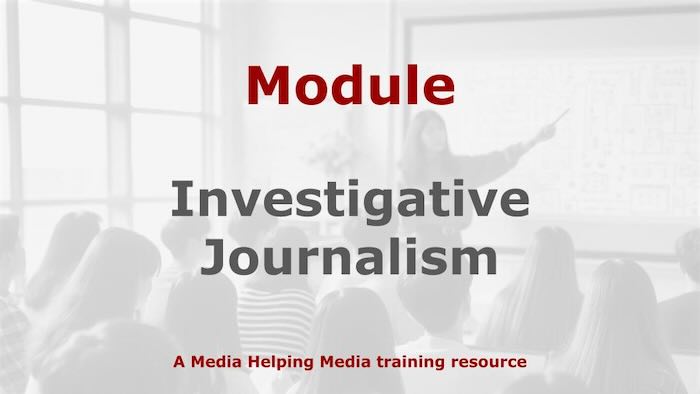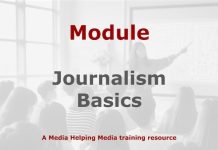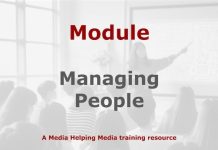 This six-week module offers an investigative journalism teaching framework, easily adaptable for universities and colleges to meet specific local requirements.
This six-week module offers an investigative journalism teaching framework, easily adaptable for universities and colleges to meet specific local requirements.
Through a blend of theoretical instruction, practical exercises, and case studies, participants will develop a robust understanding of the investigative process, from initial conception to final publication.
The module covers essential skills such as source development, document analysis, interviewing techniques, ethical considerations, and the effective use of modern tools, including artificial intelligence.
Drawing on materials from the Media Helping Media investigative journalism section, the curriculum aims to equip aspiring journalists with the mindset and practical abilities necessary to conduct impactful investigative work.
Module outline
Module Title: Investigative journalism
Module Aims:
- To understand the fundamental principles and ethics of investigative journalism.
- To develop critical thinking and research skills essential for investigative reporting.
- To learn practical techniques for identifying, developing, and managing sources.
- To gain proficiency in analysing official documents and public records.
- To master effective interviewing strategies for challenging subjects.
- To understand the role of AI and other technological tools in investigative journalism.
- To recognise and mitigate common pitfalls in investigative reporting.
- To cultivate the ‘investigative mindset’ necessary for sustained, rigorous inquiry.
Learning outcomes:
Upon successful completion of this module, students will be able to:
- Formulate a robust investigative hypothesis.
- Identify and access relevant official documents and public data.
- Conduct sensitive and effective interviews with a range of interviewees.
- Construct a comprehensive investigative dossier.
- Apply ethical considerations to complex investigative scenarios.
- Utilise basic AI tools for data analysis and research in investigative projects.
- Evaluate potential legal and ethical risks associated with investigative reporting.
- Communicate investigative findings clearly, accurately, and responsibly.
Assessment:
- Week 3: Mid-module investigative proposal and source plan (30%)
- Week 6: Final investigative project/report (individual or small group) (50%)
- Throughout: Active participation in discussions and practical exercises (20%)
Suggested timetable
Total contact hours: Approximately 24 hours (4 hours per week)
Independent study: Approximately 6-8 hours per week
Week 1: Introduction to investigative journalism & the investigative mindset
Topics:
- Defining investigative journalism: history, purpose, and impact.
- The unique challenges and rewards of investigative reporting.
- Developing the crucial “investigative mindset”.
- Understanding the journalist’s role as a public watchdog.
Activities:
- Discussion: Why is investigative journalism important in a democracy?
- Case study analysis of a prominent investigative piece.
- Brainstorming potential investigative topics.
Readings/resources:
- The mindset for investigative journalism
- Tips for investigative journalism
- Lesson: Investigative journalism
Week 2: Sources, motivations, and dossier development
Topics:
- Identifying and cultivating diverse sources.
- Understanding interviewee motivations: Why would anyone talk to a journalist?
- Building trust and ensuring source protection.
- The importance of a comprehensive investigative dossier.
- Methods for compiling and organising information.
Activities:
- Role-playing: approaches to initial source contact.
- Exercise: Identifying potential sources for a given investigative scenario.
- Practical session: Starting an investigative dossier (digital and physical methods).
Readings/sesources:
- Why would anyone want to talk to a journalist?
- Lesson: Interviewee motivation
- Compiling an investigative journalism dossier
- Lesson: Investigative dossier
- 20 ways a suspect can help a journalist
Week 3: Investigating official documents & data
Topics:
- Accessing public records and official documents.
- Strategies for analysing complex data and bureaucratic language.
- Freedom of Information (FOI) requests and other legal tools.
- Identifying red flags and discrepancies in documents.
Activities:
- Guest speaker (if possible): FOI officer or data journalist.
- Workshop: Analysing sample official documents (e.g., company reports, council minutes).
- Exercise: Drafting a simple FOI request.
Readings/eesources:
- How to investigate official documents
- Lesson: Investigating official documents
- MID-MODULE ASSESSMENT DUE: Investigative proposal and source plan
Week 4: Advanced interviewing techniques & tackling sensitive subjects
Topics:
- Interviewing reluctant or hostile subjects.
- Strategies for investigating sensitive issues like corruption.
- Ethical considerations in difficult interviews (e.g., trauma-informed approaches).
- Verification and corroboration of interview information.
Activities:
- Role-playing: Challenging interview scenarios.
- Discussion: Best practices for interviewing vulnerable individuals.
- Case studies: Successful and unsuccessful investigative interviews.
Readings/resources:
Week 5: The role of AI & technology in investigations
Topics:
- How AI is transforming investigative journalism.
- Tools and techniques for AI-powered investigations (e.g., data analysis, transcription).
- Ethical implications and limitations of AI in journalism.
- Other technological tools for mapping, visualising, and securing data.
Activities:
- Demonstration of relevant AI tools (e.g., open-source data scraping, basic text analysis platforms).
- Discussion: The future of AI in journalism – opportunities and threats.
- Exercise: Identifying how AI could assist in a given investigative scenario.
Readings/resources:
Week 6: Ethical dilemmas, legal pitfalls, and final presentation
Topics:
- Navigating legal challenges: defamation, privacy, contempt of court.
- Ethical decision-making in high-stakes investigations.
- Avoiding common pitfalls of investigative journalism.
- Structuring and presenting investigative findings effectively.
- The impact and legacy of investigative journalism.
Activities:
- Discussion of ethical dilemmas presented through case studies.
- Review of common legal pitfalls and how to avoid them.
- Student presentations/discussion of their final investigative projects.
- Concluding thoughts on the responsibility and power of investigative journalism.
Readings/resources:
- Avoiding the pitfalls of investigative journalism
- (Revisit) Lesson: Investigative journalism
- FINAL ASSESSMENT DUE: Investigative project/report
Module conclusion: embracing the investigative journey
As you reach the end of this six-week module on Investigative Journalism, it’s worth reflecting on the significant ground you will have covered. You’ve embarked on a fascinating and essential journey, learning not just the mechanics but the very heart of what it means to be an investigative journalist.
You began by defining the core principles of this demanding yet deeply rewarding field, cultivating the crucial investigative mindset needed to question, probe, and persist.
You’ve grasped how to identify and nurture sources, understanding the diverse motivations that lead individuals to speak out, and the vital importance of protecting those who share their stories.
A cornerstone of your learning involved demystifying official documents and public records. You’ve honed your skills in analysing these often opaque materials, learning how to leverage tools like Freedom of Information requests to uncover hidden truths.
You then moved into the art of the interview, exploring advanced techniques for engaging with a spectrum of subjects, from the willing witness to the reluctant suspect, always with a strong emphasis on ethical conduct.
In recent weeks, you’ve peered into the future, understanding how Artificial Intelligence (AI) and other technological advancements are rapidly reshaping the landscape of investigative reporting.
You’ve seen how these tools can amplify your research and analysis, while also discussing the ethical responsibilities that come with their use. Crucially, you’ve also spent time identifying and learning to avoid the common pitfalls that can derail even the most promising investigations, from legal challenges to ethical lapses.
Ultimately, you’ve not just learned techniques; you’ve developed a critical lens through which to view the world, a dedication to truth, and the resilience required to bring important stories to light.
The skills you’ve acquired – from meticulous dossier compilation to navigating complex ethical dilemmas – are not just for journalists but for anyone committed to informed citizenship and holding power to account.
We hope this module has ignited a passion for uncovering facts and telling impactful stories. Keep asking the difficult questions, keep digging deeper, because you are now part of the profound public service that rigorous investigative journalism provides.







